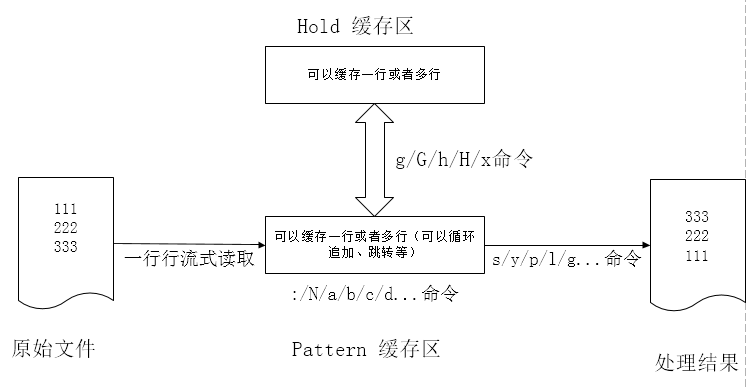简介:
sed 是古老的文本处理工具,如果熟练掌握,也是利器
实例:
需求:下面中的WHERE 与SET 互换
文件1.txt的内容是这样的:
### update test.student ### WHERE ### @1=1 /* int meta=0 */ ### @2='a' /* int meta=0 */ ### @3=1 /* int meta=0 */ ### @4='56' /* int meta=0 */ ### SET ### @1=1 /* int meta=0 */ ### @2='a' /* int meta=0 */ ### @3=1 /* int meta=0 */ ### @4='failture' /* int meta=0 */ ### update test.student
方法:
sed '/WHERE/{:a;N;/SET/!ba;s/\([^\n]*\)\n\(.*\)\n\(.*\)/\3\n\2\n\1/}' 1.txt解释:
:a 做个label,方便后面跳转到这里 N 下一行,并追加到pattern 模式(暂存区)的后面 /SET/!ba 匹配到SET 就不跳转到a 标签。 否则继续追加行 不跳转,就会接着执行后面的命令:s 替换了 这样暂存区的内容就是: ### WHERE\n ### @1=1 /* int meta=0 */\n ### @2='a' /* int meta=0 */\n ### @3=1 /* int meta=0 */\n ### @4='56' /* int meta=0 */\n ### SET *是最大匹配原则 1= ### WHERE 2= ### @1=1 /* int meta=0 */\n ### @2='a' /* int meta=0 */\n ### @3=1 /* int meta=0 */\n ### @4='56' /* int meta=0 */ 3= ### SET
扩展:
想知道原理,看下这个:(倒序排列一个文件的工作流)
sed ‘1!G;h;$!d’ file

http://blog.itpub.net/27181165/viewspace-1276719/
常用:
Sed Commands
: label # comment {....} Block
= - print line number a \ - Append b label - Branch
c \ - change d and D - Delete g and G - Get
h and H - Hold i \ - Insert l - Look
n and N - Next p and P - Print q - Quit
r filename - Read File s/..../..../ - Substitute t label - Test
w filename - Write Filename x - eXchange y/..../..../ - Transform
Sed Pattern Flags
/g - Global /1 - first /2 - second
/I - Ignore Case
/p - Print
/w filename - Write Filename
$ cat file aa 88 bb 88 88 cc 88 88
#替换第一个88为--
sed ':a;N;$!ba;s/88/--/' file
sed ':a;N;$!ba;s/88/--/1' file
#替换第n个88为--
sed ':a;N;$!ba;s/88/--/n' file
sed -n1,10p Print first 10 lines
sed -n11,$!p Print first 10 lines
mysql 的sql目录下Makefile中
.yy.cc: $(YACCCOMPILE) $< if test -f y.tab.h; then \ to=`echo "$*_H" | sed \ -e 'y/abcdefghijklmnopqrstuvwxyz/ABCDEFGHIJKLMNOPQRSTUVWXYZ/' \ -e 's/[^ABCDEFGHIJKLMNOPQRSTUVWXYZ]/_/g'`; \ sed -e "/^#/!b" -e "s/Y_TAB_H/$$to/g" -e "s|y\.tab\.h|$*.h|" \ ##与/^#/ 匹配,就不执行-e "s/Y_TAB_H/$$to/g" -e "s|y\.tab\.h|$*.h|" 的命令 y.tab.h >$*.ht; \ rm -f y.tab.h; \ if cmp -s $*.ht $*.h; then \ rm -f $*.ht ;\ else \ mv $*.ht $*.h; \ fi; \ fi if test -f y.output; then \ mv y.output $*.output; \ fi sed '/^#/ s|y\.tab\.c|$@|' y.tab.c >$@t && mv $@t $@ rm -f y.tab.c
更多实例
http://blog.chinaunix.net/uid-10540984-id-2983419.html
http://www.grymoire.com/Unix/Sed.html
不足:
sed 处理分段的文本,要求比较苛刻,比如要么以一行做分割,要么有专有标志,
现在流行的json 格式是比较完美的,结合python 等编程,要比sed 好很多
